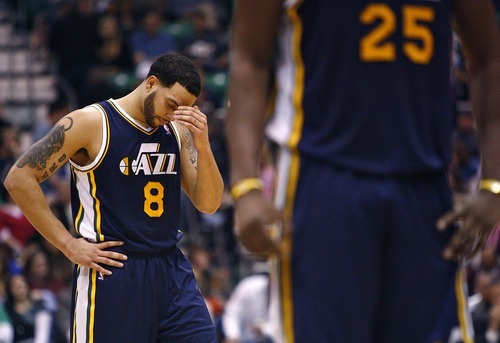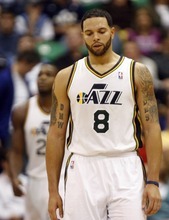This is an archived article that was published on sltrib.com in 2011, and information in the article may be outdated. It is provided only for personal research purposes and may not be reprinted.
Deron Williams wanted help. The sinking Jazz needed serious assistance, and he felt the only way aid would arrive would be via a major move before the NBA trade deadline.
But Williams also believed it would never happen. The organization was too predictable, too normal, too stuck in its ways. Moreover, the All-Star guard did not think Utah had the guts or vision to complete the deal he longed for.
Wearing a heavy crown, Williams pushed hard throughout January. Sometimes he offered tight-lipped respect for former coach Jerry Sloan and team management. Other times, he employed thinly disguised insults to voice his mounting displeasure. Injured, conflicted and frustrated, Williams attacked the organization that he played for like never before, adding harsh criticism to a season already littered with condemnation and insubordination.
But while Williams steamed, the Jazz took stock. Who exactly was this new face of the franchise? Was he truly the one? Championship worthy? John Stockton and Karl Malone-esque? Or just another highly talented but ultimately self-obsessed star who would eventually place himself above his team?
Utah also started contemplating a question that was not even debatable when the 2010-11 season began: Was Deron Williams tradeable?
—
Tired act • Sloan and longtime assistant Phil Johnson turned in their resignations Feb. 11 for a variety of reasons. A primary one: They were tired of Williams' act.
But while Williams survived Sloan's sudden departure, the All-Star's days were also numbered.
His increasingly bitter tone and obvious frustration had not gone unnoticed by Jazz management. Sloan, general manager Kevin O'Connor and anyone within the organization with basketball sense easily recognized Williams' undeniable Olympic talent. But he still had 1½ years left on his contract and his power was growing; former small-market stars such as LeBron James and Carmelo Anthony had put their old teams through the fire; and the idea that Williams — who turned down a maximum contract with Utah in 2008 and could opt of his deal after the 2011-12 season — would choose loyalty over pride, money and power had gone from a possibility to nearly nonexistent.
"He never said what [Phoenix's] Steve Nash said," O'Connor said. "He never said, 'Hey, I signed a contract, I really like it here. I want to finish it out. I'm committed to staying in Utah. Let's get some players.' It was always, 'I'll wait and see.' "
The Jazz were growing tired of waiting. Meanwhile, management was questioning whether Williams was the best long-term choice for everything from team leadership to a delicate chemistry that was strong when training camp started but had begun to fracture as the All-Star break approached.
Even former Utah star forward Karl Malone ripped Williams the day after Sloan walked away, while some Jazz players began to privately point out what fans had publicly discussed since the 2010-11 season began: Williams loved to blame others for Utah's failure, but never stepped up and shouldered the weight himself.
Williams was shocked and saddened when he was unexpectedly traded Wednesday. He recoiled again when informed that some teammates complained about his leadership.
"Man, that would surprise me a lot, because I definitely took blame," Williams said. "I didn't think I was playing well, and I hadn't been able to do the things that I'm capable of because of my wrist [injury], and I think the guys knew that. If that's how they felt, that's how they felt."
—
Calculated risk • Williams also took issue with the cold nature of his trade, news of which only made its way to him while he was watching ESPN's "SportsCenter."
But while Williams was kept in the dark, the Jazz were making a play.
After Denver took the New York Knicks to the limit Tuesday, receiving maximum worth for free-agent-to-be Carmelo Anthony, Utah knew the stage was set.
The Jazz had spent the weeks leading up to Anthony's trade gauging Williams' market value — a process that started after teams began dialing Utah's number when news of Williams' seasonlong clashes with Sloan went public, as opponents tried to sweep in and steal the disgruntled guard.
Once Anthony was finally moved, the Jazz cashed in. Utah spent the night leading up to Williams' trade contemplating the decision, weighing whether a team that started the season 27-13 was for real, or really just one that would face another disappointing first-round playoff exit. But once the Jazz realized what was on the table — a future-laden deal that contained as little risk as possible, and one that would immediately send Williams and his mounting problems packing —Utah did not hesitate.
Moreover, by intentionally keeping the trade as quiet as possible, the Jazz negated any leverage Williams still held. By not allowing him to first go public and back the organization into a corner if he disapproved of the move, Utah was able to completely elude the 24-7 Internet rumor mill and discreetly pull off the most shocking trade of the season.
To Williams, the Jazz's top-secret operation was unwarranted.
"If that's what they wanted to do, I can't stop [the trade]," Williams said. "There's nothing that I can do. Am I going to say, 'I'm not going there?' That's not who I am."
—
Moving on • As Williams came to terms with his new life, some key Jazz players questioned the organization they played for. How could a team that preaches selfless sacrifice to a system trade away its premier athlete when a playoff run was still on the line? And what did the move say to a core group of young players Utah was now building around?
Even Jazz coach Tyrone Corbin was left out of the picture. While he prepared for a road game Wednesday against Dallas, Utah was quietly trading away the face of the franchise. But Corbin had no input in the decision, and was only informed of the deal after the move had been greenlighted.
"I feel I'm in the loop where I need to be in the loop, and I trust what they do completely," Corbin said.
Several Jazz players took up for Williams, pointing out that he was dealing with a tough situation any star would have suffered from. One player went so far as to compare Williams' struggles leading a team that played for the strong-willed Sloan and an equally rigid organization to the same no-win scenario that the Lakers' Kobe Bryant faced early in his career.
Meanwhile, veteran Utah guard Raja Bell backed his friend, saying that he had no problem with how Williams led the Jazz.
"Part of being a leader on a team is voicing your opinion at times when you think your team is not being put in the best position to win," Bell said.
Williams' voice was ultimately drowned out.
The Jazz made the big-name, blockbuster trade Williams believed the team was too afraid to pull off. But instead of bringing in a star wing player or rebound-savvy big man who could share the weight Williams had been carrying, he was the one who was gone.
The Jazz were moving on. Williams was a Net.
"I had a great time [in Utah]," Williams said. "I hate that the last two months put a damper on things and kind of tarnished that."
Kurt Kragthorpe, Steve Luhm and Gordon Monson contributed to this report. —
Celtics at Jazz
P At EnergySolutions Arena
Tipoff • 7 p.m.
TV • FSN Utah, NBA TV
Radio • 1320 AM, 1600 AM, 98.7 FM
Records • Celtics 42-15, Jazz 32-28
Last meeting • Celtics, 110-86 (Jan. 21)
About the Celtics • Boston ranks first out of 30 teams in average points allowed (91.2) and assists (24.3) but 29th in rebounds (38.8). … The Celtics have won four of five games and are 2-1 in a four-game road trip that ends Monday night. … Guard Rajon Rondo leads the NBA in assists (12.1).
About the Jazz • Utah went 1-2 on a recent road trip and has lost 15 of its past 20 games. … Devin Harris has averaged 15.5 points, 8.5 assists and 4.5 rebounds in his first two contests since joining the Jazz in a trade for Deron Williams. … Al Jefferson is averaging 27 points, 9.4 rebounds and 2 blocks while shooting 59 percent from the field in his past five games. —
Read our Jazz Notes
V For exclusive news, interviews, video and analysis, check The Tribune's Jazz Notes blog. > sltrib.com/blogs/jazznotes





